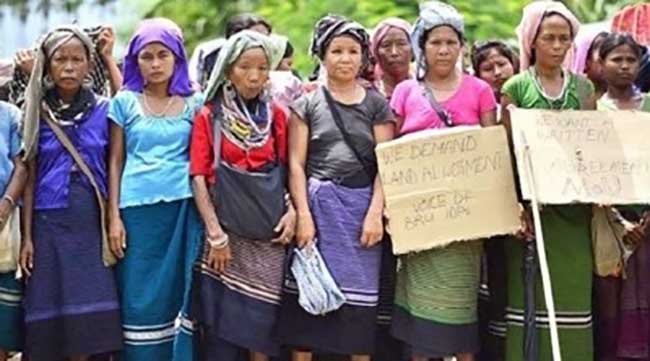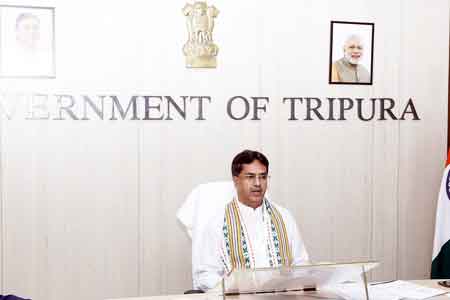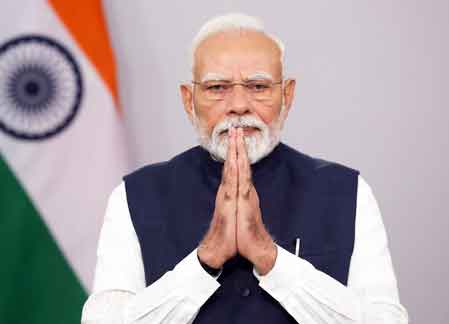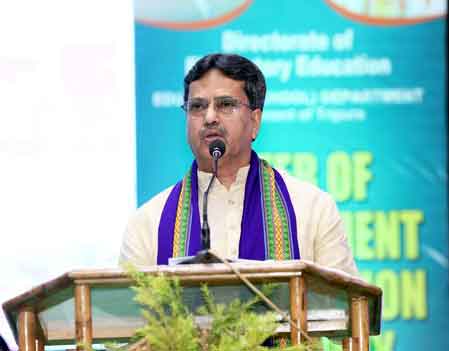Ending the two decades of strife and insurgency, a tripartite peace Accord was signed in 1986 and the mountainous Mizoram became the 23rd state of India and since then, except in 1997 ethnic troubles, India's second least populous state has remained peaceful in terms of ethnic harmony.
Unlike Manipur, for the all round socio-economic development of different non-Mizo minority tribal communities, Mizoram has three tribal autonomous bodies -- the Lai Autonomous District Council (LADC), the Chakma Autonomous District Council (CADC), and the Mara Autonomous District Council (MADC).
These three constitutional autonomous bodies, formed through elections, look after the overall welfare and development of the Lai, Mara, and Chakma tribals, living along borders with Myanmar and Bangladesh.
In October 1997, following ethnic troubles in Mizoram after the killing of a Mizo forest official, over 38,072 Reang tribal migrants, comprising 7,364 families including women and children, had to leave their villages in the state and had sheltered in seven camps in northern Tripura's Kanchanpur and Panisagar Sub-Divisions.
A total of 6,367 tribals returned to Mizoram in eight phases after the Centre, Mizoram, and Tripura governments had made many attempts to repatriate them between 2009 and 2019 but the majority were reluctant to return to their home state unless their demands, including security and livelihood, were fulfilled.
Subsequently, after several years of tussles and agitations, a quadripartite agreement was signed in January 2020 between the Centre, Tripura, and Mizoram governments and the Reang tribal leaders to resettle the 37,136 tribal immigrants comprising 6,302 families in 11 or 12 locations in four of Tripura’s eight districts.
Tripura too witnessed ethnic trouble after the Mizo and Bengali communities, living in northern Tripura, strongly opposed the rehabilitation of Reang tribals in Kanchanpur areas as it doed not have "no sufficient lands" for their settlement.
The proposed target for the resettlement of the Reang tribals by August 31, 2022 could not be achieved due to the fresh troubles, threats of agitation against the rehabilitation and numerous other issues.
The worst-ever ethnic violence over the rehabilitation of the displaced Reang tribals in December 2020 had left two persons dead and scores injured during a national highway blockade in northern Tripura.
The Joint Movement Committee (JMC), an apex body of various organisations, including the Nagarik Suraksha Mancha (NSM) and Mizo Convention, had organised agitations against the “unplanned rehabilitation of Reang tribals jeopardising the security, livelihood and economic conditions of the indigenous people of Kanchanpur”, bordering Mizoram.
The Reang tribals, locally called ‘Bru', according to the quadripartite agreement (January 2020) were to be included as voters in Tripura as maintained in the agreement after which the Centre had announced a Rs 600 crore package for the settlement of the Reang tribals, recognised as a primitive tribe in Tripura.
The Election Commission had already deleted thousands of names of Reang tribals from the electoral list of Mizoram.
Officials of the Mizoram Election Department said that in consultation with the Election Commission, names of several thousand voters belonging to the Reang tribal community had been, so far, deleted in three districts of Mamit, Kolasib and Lunglei.








No Pakistani national in Tripura, says CM Manik Saha
The Chief Minister’s remarks came in response to the Central government's recent directive to all states and Union Territories to identify and deport Pakistani citizens following the April 22 terrorist attack at Pahalgam in Jammu and Kashmir.
India shuts airspace for all Pakistan-operated flights till May 23
In a significant development, India on Wednesday announced to shut its airspace for Pakistan-owned and operated flights till May 23 (estimated), days after Islamabad decided to shut its airspace to all flights owned and operated by the Indian carriers.
Tripura’s unemployment rate dropped after BJP came to power: CM Saha
Tripura Chief Minister Manik Saha on Wednesday said that the unemployment rate in the state has significantly decreased during the past seven years after the BJP came to power in 2018.
Travesty of justice: Bangladesh SC stays High Court order granting bail to Chinmoy Das
The Appellate Division of the Bangladesh Supreme Court on Wednesday evening stayed the High Court order given earlier in the day granting bail to Chinmoy Krishna Das, or Chandan Kumar Dhar, the former ISKCON monk and spokesperson of Bangladesh Sammilito Sanatani Jagaran Jote in a sedition case.
Right step: Kharge welcomes govt’s move on caste census, demands budget allocation
Congress President Mallikarjun Kharge on Wednesday welcomed the Central government’s decision to conduct a caste-based census, calling it a long-pending demand of the Opposition and a crucial step towards ensuring social justice.
Goyal holds talks in Oslo to strengthen India-Norway trade & investment ties
Commerce and Industry Minister Piyush Goyal held separate meetings here, on Wednesday, with Norway’s Minister of Foreign Affairs Espen Barth Eide and the Scandinavian country’s Minister of Trade and Industry Cecilie Myrseth to discuss the implementation of the India-EFTA Trade and Economic Partnership Agreement and strengthen bilateral ties between the two countries.
21 MLAs urged PM, HM to reinstate govt in Manipur bypassing Guv: Congress
The Opposition Congress on Wednesday slammed 21 MLAs of Manipur for bypassing the state Governor and writing letters to the Prime Minister and Union Home Minister, urging them to reinstate a popular government in the state.
Caste count goes official: BJP seizes agenda; INDIA bloc faces strategic recalibration
In a landmark decision with far-reaching social and political implications, Prime Minister Narendra Modi-led government has approved the inclusion of caste enumeration in the upcoming national Census.